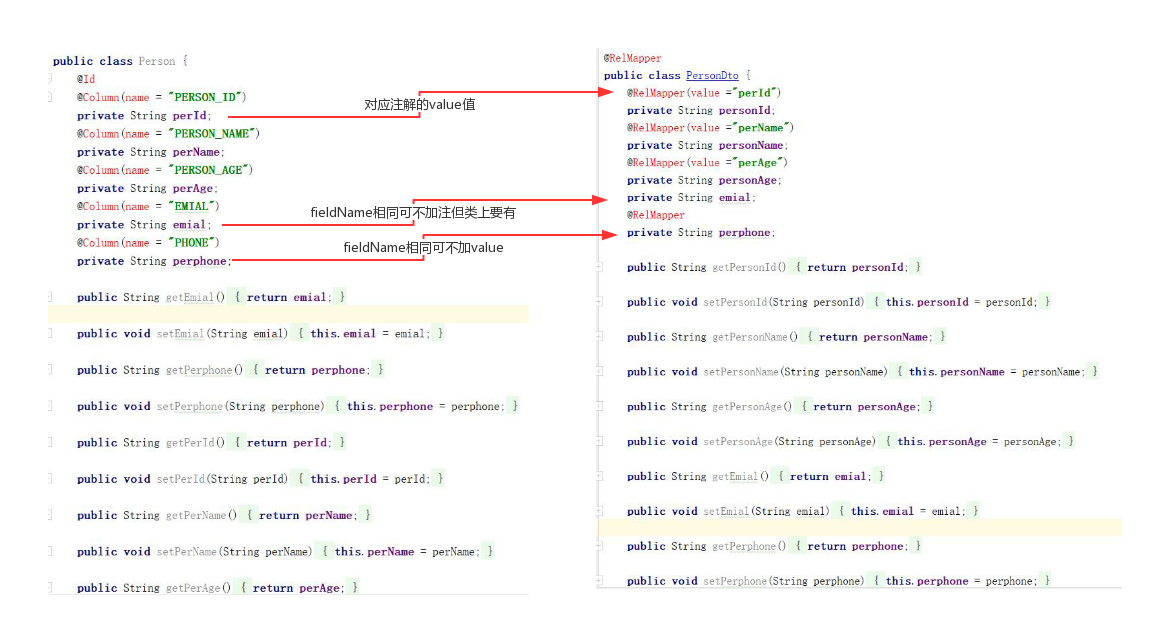序言
近期在工作中管理代码时发现,在项目中从Dao层到Service层数据传递中通过大量的get(),set()方法去一个一个的去拿值去赋值,导致代码篇幅过长,对此甚是讨厌,并且严重消耗开发时间。起初找过些关于这块的资料,现在大部分都是Entity类和Dto类的属性名相同的前提下,利用反射实现,太局限了,如果要改成同名,按目前项目的程度去整改工作量太大,不现实。后面看了Spring注解的实现,然后结合找到反射实现资料,突想奇发尝试着用自定义注解+反射方式的去实现,事实证明这方法是可行的。故分享至此,希望能帮到大家。
整体实现三步骤:1.自定义注解 2.工具类方法实现反射 3.使用(测试)
1.自定义注解
1 import java.lang.annotation.*; 2 3 @Target({ElementType.FIELD,ElementType.TYPE}) //Target 注解的使用域,FIELD表示使用在属性上面,TYPE表示使用在类上面 4 @Retention(RetentionPolicy.RUNTIME) //Retention 设置注解的生命周期 ,这里定义为RetentionPolicy.RUNTIME 非常关键 5 @Documented 6 public @interface RelMapper { 7 //自定义属性 8 String value() default ""; 9 String type() default ""; // value : status(标记属性值为Y/N的属性) / date(标记属性类型为时间) 10 }
自定义属性,大家可以根据自己项目中的需求增加不同的属性。
2.工具类方法实现
1 import java.lang.reflect.Field; 2 import java.lang.reflect.Method; 3 import java.sql.Timestamp; 4 import java.util.Date; 5 import org.apache.commons.lang.StringUtils; 6 import com.ctccbs.common.annotation.RelMapper; 7 8 public class RelationMapperUtils { 9 /** 10 * Entity and Dto Mapper 11 * @param entry 12 * @param dto 13 * @param enToDto 14 * ture : Entity To Dto (defult) 15 * false : Dto To Entry 16 * Rule: 17 * 实现相互转换前提: Dto field name(dto和entry的field name相同并且 类上有@RelMapper) 或 field的@RelMapper(value="Entity field name") 满足其一即可转换 18 * @return 19 * @throws Exception 20 */ 21 public static Object entryAndDtoMapper(Object entity, Object dto) throws Exception{ 22 return EnAndDtoMapper(entity, dto,true); 23 } 24 25 public static Object entryAndDtoMapper(Object entity, Object dto,boolean enToDto) throws Exception{ 26 return EnAndDtoMapper(entity, dto,false); 27 } 28 //last version 29 public static Object EnAndDtoMapper(Object entry, Object dto,boolean enToDto) throws Exception{ 30 if(enToDto == true ? entry == null : dto == null){ return null;} 31 Class<? extends Object> entryclazz = entry.getClass(); //获取entity类 32 Class<? extends Object> dtoclazz = dto.getClass(); //获取dto类 33 boolean dtoExistAnno = dtoclazz.isAnnotationPresent(RelMapper.class); //判断类上面是否有自定义注解 34 Field [] dtofds = dtoclazz.getDeclaredFields(); //dto fields 35 Field [] entryfds = entryclazz.getDeclaredFields(); //entity fields 36 Method entrys[] = entryclazz.getDeclaredMethods(); //entity methods 37 Method dtos[] = dtoclazz.getDeclaredMethods(); //dto methods 38 String mName,fieldName,dtoFieldType=null,entFieldType=null,dtoMapName = null,dtoFieldName =null;Object value = null; 39 for(Method m : (enToDto ? dtos : entrys)) { //当 enToDto=true 此时是Entity转为Dto,遍历dto的属性 40 if((mName=m.getName()).startsWith("set")) { //只进set方法 41 fieldName = mName.toLowerCase().charAt(3) + mName.substring(4,mName.length()); //通过set方法获得dto的属性名 42 tohere: 43 for(Field fd: dtofds) { 44 fd.setAccessible(true); //setAccessible是启用和禁用访问安全检查的开关 45 if(fd.isAnnotationPresent(RelMapper.class)||dtoExistAnno){ //判断field上注解或类上面注解是否存在 46 //获取与Entity属性相匹配的映射值(两种情况:1.该field上注解的value值(Entity的field name 和Dto 的field name 不同) 2.该field本身(本身则是Entity的field name 和Dto 的field name 相同)) 47 dtoMapName = fd.isAnnotationPresent(RelMapper.class) ? (fd.getAnnotation(RelMapper.class).value().toString().equals("")?fd.getName().toString():fd.getAnnotation(RelMapper.class).value().toString()):fd.getName().toString(); 48 if(((enToDto ? fd.getName() : dtoMapName)).toString().equals(fieldName)) { 49 dtoFieldType = fd.getGenericType().toString().substring(fd.getGenericType().toString().lastIndexOf(".") + 1); // 获取dto属性的类型(如 private String field 结果 = String) 50 for(Field fe : entryfds) { 51 fe.setAccessible(true); 52 if(fe.getName().toString().equals(enToDto ? dtoMapName : fieldName) ) {//遍历Entity类的属性与dto属性注解中的value值匹配 53 entFieldType = fe.getGenericType().toString().substring(fe.getGenericType().toString().lastIndexOf(".") + 1); //获取Entity类属性类型 54 dtoFieldName = enToDto ? dtoMapName : fd.getName().toString(); 55 break tohere; 56 } 57 } 58 } 59 } 60 } 61 if(dtoFieldName!= null && !dtoFieldName.equals("null")) { 62 for(Method md : (enToDto ? entrys : dtos)) { 63 if(md.getName().toUpperCase().equals("GET"+dtoFieldName.toUpperCase())){ 64 dtoFieldName = null; 65 if(md.invoke(enToDto ? entry : dto) == null) { break;} //去空操作 66 //Entity类field 与Dto类field类型不一致通过TypeProcessor处理转换 67 value = (entFieldType.equals(dtoFieldType))? md.invoke(enToDto ? entry : dto) :TypeProcessor(entFieldType, dtoFieldType,md.invoke(enToDto ? entry : dto),enToDto ? true : false); 68 m.invoke(enToDto ? dto : entry, value); //得到field的值 通过invoke()赋值给要转换类的对应属性 69 value = null; 70 break; 71 } 72 } 73 } 74 } 75 } 76 return enToDto ? dto : entry; 77 } 78 79 //类型转换处理 80 public static Object TypeProcessor(String entFieldType,String dtoFieldType, Object obj,boolean enToDto) { 81 if(entFieldType.equals(dtoFieldType)) return obj; 82 83 if(!entFieldType.equals(dtoFieldType)) { 84 switch(entFieldType) { 85 case "Date": 86 return (enToDto)?TypeConverter.dateToString((Date) obj):TypeConverter.stringToDate(obj.toString()); 87 case "Timestamp": 88 return TypeConverter.timestampToTimestampString((Timestamp)obj); 89 case "Integer": 90 return (enToDto) ? obj.toString() : Integer.parseInt((String)obj) ; 91 } 92 } 93 return obj; 94 }
上面EnAndDtoMapper()方法的实现是Entity和Dto之间互相转换结合在一起,enToDto = true 表示的是Entity转Dto实现,false则相反。
3. 如何使用?
1)Entity类 与 Dto类对应

2)调用
扫描二维码关注公众号,回复:
4629937 查看本文章


public static void main(String[] args) { //Entity数据转成Dto数据集 Person person = dao.getPersonRecord(); RelationMapperUtils.entryAndDtoMapper(person,new PersonDto()); //Dto数据转成Entity数据 RelationMapperUtils.entryAndDtoMapper(new Person(),personDto,false); }
以上便能自动实现数据的转换,大量减少get,set的代码,省事!!!
大家如果还有其他的需求都可以往方法中添加,来达到适合项目的需求,整体下来扩展性算还不错。
希望对大家有所帮助,有不解或不足的代码欢迎点出。大家一起进步
最后,本博主是入博不久,会定期更新所学所感所获,希望各位爷喜欢,一起成长!!!喜欢的可以关注喔
-------------------------------
喜欢老夫的点波关注呗^ ^ ,Thank ! ! ! !